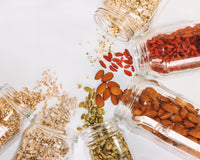The ‘Anything is Pulse-able’ campaign from Eating Better aims to give food for thought by raising awareness of the health, cost-saving, and environmental benefits of eating pulses such as beans, lentils, and peas by providing information and inspiration on why and how we should be incorporating more pulses into our diets.
There has been an increase in the people that have adopted a more sustainable lifestyle in the last 12 months, including people reducing their meat consumption. However research has shown that the barriers to more people being sustainable are related to cost and lack of information.
We want to show inflation need not stop people from leading a healthy and sustainable lifestyle. ‘Anything is Pulse-able’ promotes that the easiest and best choice you can make to benefit your health and the environment, is with the food you buy and eat.
Why pulses?
Pulses (also known as legumes) are a healthy and sustainable food choice affordable and accessible to everyone.
Food that costs you less
Eating pulses can save you money. Adding pulses to your meals can bring the cost down and keep the flavour up.
Pulses are affordable and consumed across the globe. In a time of rising food prices, pulses remain affordable and accessible for everyone, and we want to ensure that the current cost of living pressures do not prevent people eating healthy and sustainable diets.
Food that doesn’t cost your health
Eating pulses such as lentils, peas and beans all count towards you five-a-day and help protect against disease.
Pulses are nutrient rich, affordable and sustainable sources of plant protein. As well as being significant sources of protein and micronutrients, they also contain high quantities of fibre.
High-fibre intake from pulses has been associated with reduced blood pressure and risk of cardiovascular disease and according to the British Heart Foundation they can help lower your risk of heart disease, stroke, type 2 diabetes, and bowel cancer.
Good for planet: Food that doesn’t cost the earth
Eating more pulses and vegetables is better for the climate and nature.
Pulses are good for the environment. They directly benefit soil quality by fixing nitrogen and protecting soil microbes, reducing the need for synthetic fertilisers. Compared to animal protein sources, pulses have lower carbon and water footprints.
Pulses because of their role in improving sustainability, through soil management, also positively impact food security. Soil degradation is a major threat to food security in many areas of the world. Africa is particularly impacted by soil degradation, yet pulses are part of traditional diets, and often grown by small farmers. By improving the crop patterns using pulses, farmers can improve their yields and limit the long-term threat to food security that soil degradation represents.






